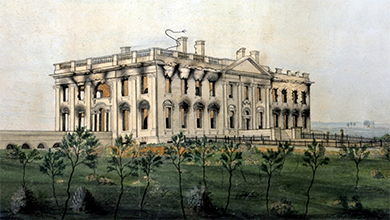| << Chapter < Page | Chapter >> Page > |

After the British bombed Baltimore’s Fort McHenry in 1814 but failed to overcome the U.S. forces there, Francis Scott Key was inspired by the sight of the American flag, which remained hanging proudly in the aftermath. He wrote the poem “In Defense of Fort McHenry,” which was later set to the tune of a British song called “The Anacreontic Song” and eventually became the U.S. national anthem, “The Star-Spangled Banner.”
Oh, say, can you see, by the dawn’s early light,
What so proudly we hailed at the twilight’s last gleaming?
Whose broad stripes and bright stars, thru the perilous fight,
O’er the ramparts we watched, were so gallantly streaming?
And the rockets’ red glare, the bombs bursting in air,
Gave proof through the night that our flag was still there.
O say, does that star-spangled banner yet wave
O’er the land of the free and the home of the brave?
On the shore dimly seen through the mists of the deep,
Where the foe’s haughty host in dread silence reposes,
What is that which the breeze, o’er the towering steep,
As it fitfully blows, half conceals, half discloses?
Now it catches the gleam of the morning’s first beam,
In full glory reflected, now shines on the stream:
Tis the star-spangled banner: O, long may it wave
O’er the land of the free and the home of the brave!
And where is that band who so vauntingly swore
That the havoc of war and the battle’s confusion
A home and a country should leave us no more?
Their blood has washed out their foul footsteps’ pollution.
No refuge could save the hireling and slave
From the terror of flight or the gloom of the grave:
And the star-spangled banner in triumph doth wave
O’er the land of the free and the home of the brave.
O, thus be it ever when freemen shall stand,
Between their loved home and the war’s desolation!
Blest with victory and peace, may the heav’n-rescued land
Praise the Power that hath made and preserved us a nation!
Then conquer we must, when our cause it is just,
And this be our motto: “In God is our trust”
And the star-spangled banner in triumph shall wave
O’er the land of the free and the home of the brave!
—Francis Scott Key, “In Defense of Fort McHenry,” 1814
What images does Key use to describe the American spirit? Most people are familiar with only the first verse of the song; what do you think the last three verses add?
Visit the Smithsonian Institute to explore an interactive feature on the flag that inspired “The Star-Spangled Banner,” where clickable “hot spots” on the flag reveal elements of its history.
With the end of the war in Europe, Britain was eager to end the conflict in the Americas as well. In 1814, British and U.S. diplomats met in Flanders, in northern Belgium, to negotiate the Treaty of Ghent, signed in December. The boundaries between the United States and British Canada remained as they were before the war, an outcome welcome to those in the United States who feared a rupture in the country’s otherwise steady expansion into the West.
The War of 1812 was very unpopular in New England because it inflicted further economic harm on a region dependent on maritime commerce. This unpopularity caused a resurgence of the Federalist Party in New England. Many Federalists deeply resented the power of the slaveholding Virginians (Jefferson and then Madison), who appeared indifferent to their region. The depth of the Federalists’ discontent is illustrated by the proceedings of the December 1814 Hartford Convention, a meeting of twenty-six Federalists in Connecticut, where some attendees issued calls for New England to secede from the United States. These arguments for disunion during wartime, combined with the convention’s condemnation of the government, made Federalists appear unpatriotic. The convention forever discredited the Federalist Party and led to its downfall.
Due to slow communication, the last battle in the War of 1812 happened after the Treaty of Ghent had been signed ending the war. Andrew Jackson had distinguished himself in the war by defeating the Creek Indians in March 1814 before invading Florida in May of that year. After taking Pensacola, he moved his force of Tennessee fighters to New Orleans to defend the strategic port against British attack.
On January 8, 1815 (despite the official end of the war), a force of battle-tested British veterans of the Napoleonic Wars attempted to take the port. Jackson’s forces devastated the British, killing over two thousand. New Orleans and the vast Mississippi River Valley had been successfully defended, ensuring the future of American settlement and commerce. The Battle of New Orleans immediately catapulted Jackson to national prominence as a war hero, and in the 1820s, he emerged as the head of the new Democratic Party.
The United States was drawn into its “Second War of Independence” against Great Britain when the British, engaged in the Napoleonic Wars against France, took liberties with the fledgling nation by impressing (capturing) its sailors on the high seas and arming its Indian enemies. The War of 1812 ended with the boundaries of the United Stated remaining as they were before the war. The Indians in the Western Confederacy suffered a significant defeat, losing both their leader Tecumseh and their fight for contested land in the Northwest. The War of 1812 proved to be of great importance because it generated a surge of national pride, with expressions of American identity such as the poem by Francis Scott Key. The United States was unequivocally separate from Britain and could now turn as never before to expansion in the West.

Notification Switch
Would you like to follow the 'U.s. history' conversation and receive update notifications?